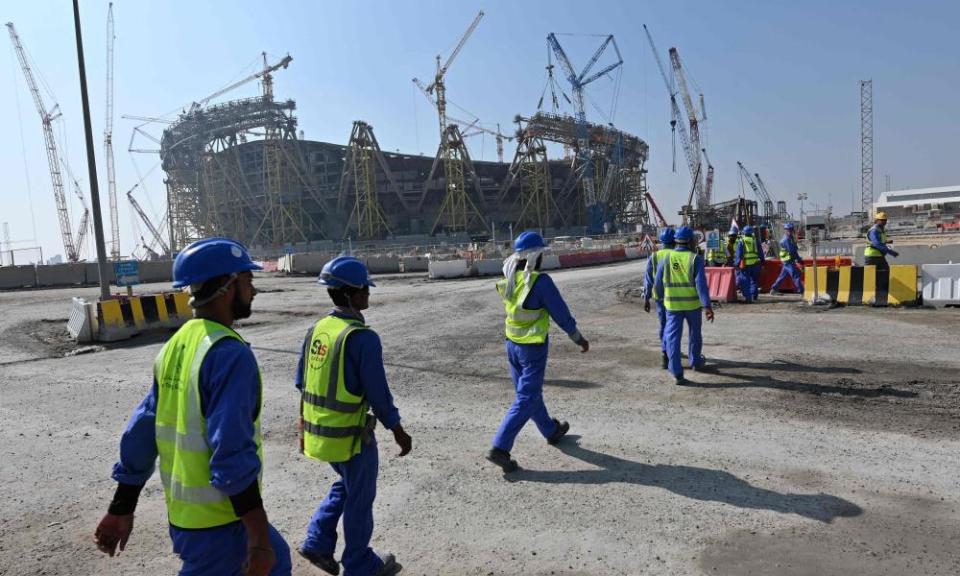Amnesty report: Qatar migrant workers trapped and exploited before World Cup

Reforms in Qatar have stalled with a year to go before the World Cup, leaving thousands of migrant workers trapped and exploited, according to a damning new report by Amnesty International.
Last year Qatar passed two laws to end restrictions on migrant workers leaving the country or changing jobs without their employer’s permission, which were widely welcomed. However, Amnesty has accused the authorities of “complacency” in applying the laws and says it has led to the worst elements of the kafala system, which binds workers to their employer, resurfacing.
A new 48-page Amnesty report, Reality Check 2021, quotes one migrant worker saying she was threatened by her employer when she wanted to change jobs and told she had to pay 6,000 Qatari riyals (£1,200) – more than five times her monthly salary – for a no-objection certificate or else be sent home.
Although the change in law should have allowed her to change jobs freely, the complaint she submitted to the Ministry of Administrative Development, Labour and Social Affairs was rejected, Amnesty says.
Other practices, such as withholding salaries and benefits to make it harder for workers to leave their jobs, are also still going on, according to Amnesty.
“Apparent complacency by the authorities is leaving thousands of workers at continued risk of exploitation by unscrupulous employers, with many unable to change jobs and facing wage theft,” said Mark Dummett, the human rights organisation’s global issues programme director.
“They have little hope of remedy, compensation or justice. After the World Cup, the fate of the workers who remain in Qatar will be even more uncertain.”
Qatar’s treatment of its migrant workforce of 2 million has come under unrelenting scrutiny since it won the right to host the competition in 2010.
In August Amnesty also accused the country of failing to investigate the deaths of thousands of migrant workers in the past decade.
It has now urged Fifa to call on the Qatar government to fulfil its programme of labour reforms before the opening match of the World Cup on 21 November next year.
“Qatar is one of the richest countries in the world but its economy depends on the 2 million migrant workers who live there,” Dummett said. “By sending a clear signal that labour abuses will not be tolerated, penalising employers who break laws and protecting workers’ rights, Qatar can give us a tournament that we can all celebrate. But this is yet to be achieved.”
Sacha Deshmukh, Amnesty International UK’s chief executive, said the Football Association could do more to press the authorities in Doha. “The exploitation of Qatar’s massive migrant workforce has already cast a dark shadow over next year’s World Cup, and the FA ought to use the remaining year until kick-off to push for lasting labour reforms in Qatar,” he said.
“The FA is part of the Uefa Working Group on Workers’ Rights in Qatar and can press the Doha authorities over strengthening migrant worker protections, investigating worker deaths and helping to fashion a tournament with a genuinely positive legacy.
“It’s more important than ever that England’s coaching staff, players and supporters raise human rights issues ahead of next year’s kick-off.”
In a statement, the government of Qatar said it rejected Amnesty’s assertion that labour reforms have not translated into changes on the ground for migrant workers.
“Amnesty fails to document a single story from among the 242,870 workers who have successfully changed jobs since barriers were removed in September 2020, or from the more than 400,000 workers who have directly benefited from the new minimum wage through salary increases and other financial incentives,” it said.
“Since exit permits were removed in 2018, hundreds of thousands of workers have left Qatar and returned without permission from their employer; improvements to the Wage Protection System now protect more than 96% of eligible workers from wage abuse; new visa centres in labour-sending countries have significantly reduced exploitative practices before workers arrive in Qatar; and new rules extend the ban on summer working to minimise the effects of heat stress.
“In the first half of 2021, 35,280 accommodation and worksite inspections were carried out and 13,724 penalties were issued to violating companies, including worksite closures, fines and prison sentences. A further 4,840 site visits were made by labour inspectors to raise awareness of the new laws among employers and employees. Systemic reform is a long-term process and shifting the behaviour of every company takes time.”

 Yahoo Sport
Yahoo Sport 





































